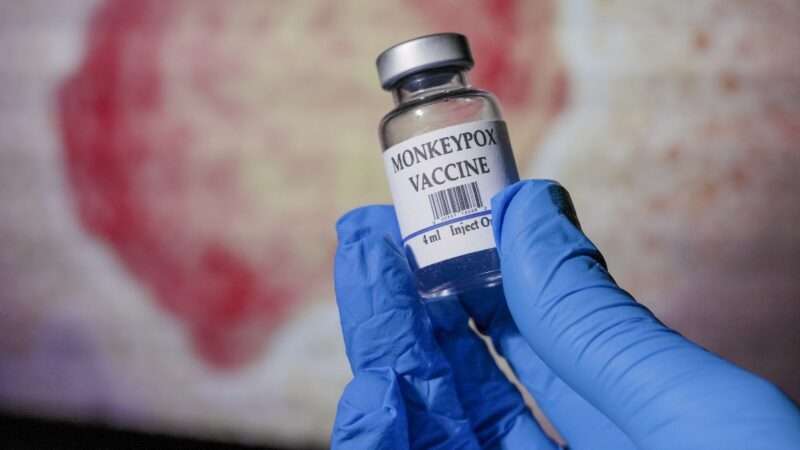
Monkeypox arrived in the U.S. in May, and it appears as though, despite the last two years of dealing with an epidemic that pretty much shut down the entire country, federal agencies like the Centers for Disease Control and Prevention (CDC) and the Food and Drug Administration (FDA) are still falling on their faces in response.
In the two months since the first case of monkeypox was discovered, the U.S. has seen at least 800 more people infected, and that's likely an undercount due to lack of testing.
Monkeypox is a viral disease spread primarily among humans by close skin-to-skin contact or exchange of bodily fluids. (This includes sex, but to be clear, it's not just a sexually-transmitted disease.) It starts with symptoms similar to the flu, leading to painful rashes and lesions that can last for weeks. Fortunately, it's typically not fatal, and there have been no U.S. deaths reported. The virus originated in Africa and spread once to the U.S. in 2003. This latest outbreak spread to Europe and then to the U.S.
The U.S. knows how to treat monkeypox. We have vaccines to prevent it, approved by the FDA in 2019. And yet, here we are watching a virus spread because apparently, the government is unable to effectively operate a program to respond in a timely fashion to an emergency.
NPR reports that the reason the infection rate is likely undercounted is that the CDC was not prepared to roll out testing and vaccinations, even though we've known it was coming for some time.
But it gets worse. We have many of the vaccinations we need to stop the spread. We have more than 1 million doses of vaccines sitting in a warehouse in Denmark. Why are they still there after the virus arrived in the U.S. two months ago? Tiresome and now-familiar red tape from the FDA.
New York magazine reports that we've gotten 300,000 doses of the drug, Jynneos, from the manufacturer, Bavarian Nordic. Those doses came from facilities in Denmark that had been inspected by the FDA. But then Bavarian Nordic opened a new facility and started stockpiling vaccinations there. In order for those drugs to be shipped to the U.S., the FDA must inspect the facility first. It had not. The company had planned to apply for an inspection in August. Given the situation, they've moved up the inspection to the start of July. It's actually happening right now while the virus spreads across the United States. Only then will those drugs be allowed to be distributed here.
And it gets even dumber. The facility has been inspected by the European Medicines Agency, which determined that is in compliance with both Europe and U.S. standards. But the FDA will not recognize the E.U.'s inspections and insists on its own before allowing the vaccines to be shipped here. An FDA spokesperson told New York magazine that this delay will not affect the availability of the vaccine.
That claim seems not entirely credible, given that New York magazine's piece opens with an injection of reality: In New York City, clinics ran out of vaccination doses almost immediately when offering them in June. People couldn't get shots, and the result was that infections spread around via close contact among gay men during Pride festivities.
But to be clear, while monkeypox may be centered in major cities and among gay men, cases have spread across the whole country and have been found in nearly every state and even Puerto Rico. Given the undercounting and lack of testing, it's probably all over the U.S. by now.
The lack of apparent real urgency by the FDA has been noticed. From New York magazine:
"My impression is that there is very little coordination and leadership across the U.S. government about what's going on here," says a former senior U.S. official who has been in touch with the White House over the past few weeks about the monkeypox response. "It feels to me like there's nobody in charge of this. Who is driving this forward?"
The whole affair seems not unlike what happened with the baby formula crisis, where even as the U.S. was hit with a shortage, FDA regulations made it next to impossible to import perfectly safe formula from Europe. In this case, the culprit is not protectionist policies and tariffs designed to favor U.S. manufacturers. Nevertheless, even in an obvious crisis, the FDA can't move quickly enough to stop an epidemic that we already have the drugs to prevent.
The post The U.S. Government Had What It Needed To Prevent the Spread of Monkeypox. It Happened Anyway. appeared first on Reason.com.







